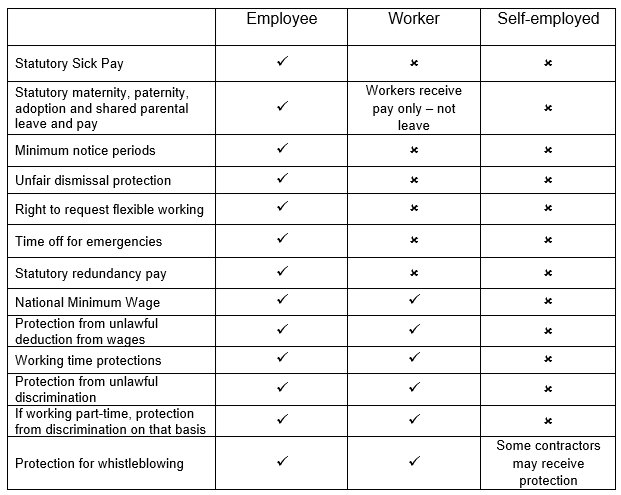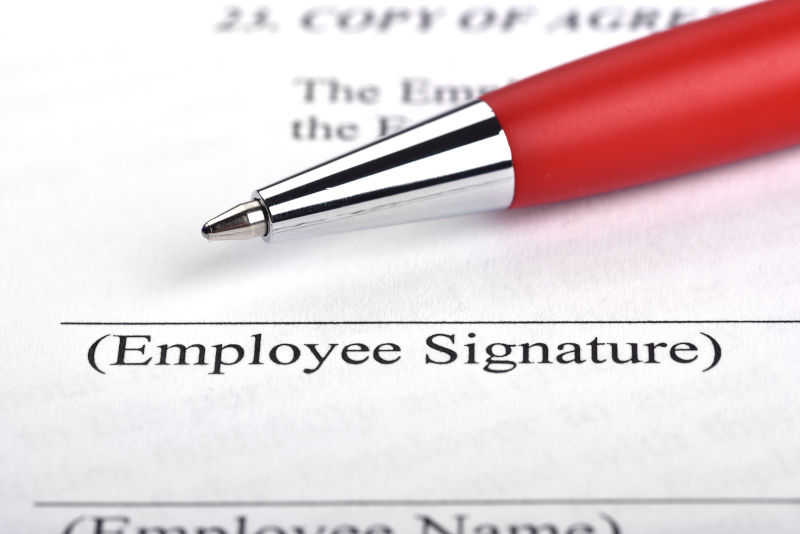Knowing your rights is a big part of being able to enforce them. Your status, whether as an employee, worker, or someone who is self-employed, can greatly affect the extent of your employment rights.
For such important distinctions, you might think that the law would have it pretty much nailed down. But relatively recent trends in the labour market have put strain on traditional classifications and thrown a spotlight on a number of grey areas.
Self-employment is increasing, with official UK statistics documenting a rise from 3.8 million in 2008 to 4.6 million in 2015. One of the reasons attributed to this is the growth of a so-called ‘gig economy’. The term is used to describe certain working practices, often which involve people obtaining temporary and short-term work through online systems or smartphone apps.
Several recent, high-profile cases have turned upon how those working in the gig economy are to be classified. However, before considering these cases, it is worth looking at the main employment classifications themselves:
- Employee: Defined as someone who works under a contract of employment (s.230(1) Employment Rights Act 1996)
- Worker: A broader term which covers employees but also includes someone working under any other kind of contract whereby they agree to provide work or services to another party, and that other party is not characterised as their client or customer. (s.230(3) Employment Rights Act 1996)
- Self-employed or Contractor (sometimes called an Independent Contractor): Essentially, this is someone working for themselves, running their own business. There is no statutory definition of someone who is self-employed.
What effect does my employment status have on my rights?
The following table summarises the various rights and protections granted by different classifications:
It should be noted that these are statutory employment rights – i.e. from legislation. Other rights may be granted from different sources, such as from your contract of employment or from a contract with a client if you are self-employed.
Employment status and tax
As the table above shows, legal protections can vary greatly between the different classifications. However, increased employment rights, in most cases, come with increased taxes – such as PAYE tax and higher National Insurance contributions. Although, to confuse matters, it is possible for someone to have one employment status in relation to their employment rights and yet be considered to have a different status for tax purposes.
What is my employment status?
It might be obvious to you which category you fall into, but difficulties can arise in situations where an individual’s employment status is unclear – especially when based on the sparse definitions given by legislation.
For this reason, the courts have developed various tests to determine employment status. In particular, an individual’s status is construed from the degree to which certain aspects are evident in their work relationship. These aspects are broadly as follows:
- Mutuality of obligation – This refers to the need for obligations to be placed upon both the individual and employer. The former must provide his or her own work and skill in exchange for a wage, or other kind of remuneration, from the latter. This must be present for someone to be considered an employee.
- Control – The individual agrees, either expressly or by implication, that he or she will be subject to the employer’s control to some extent when carrying out their work. This must also be present (and to a sufficient extent) for someone to be considered an employee.
- Other contract terms –These will also be considered when determining the individual’s status. There must be a contract for someone to be considered an employee, although technically this can be an implied contract.
- Other relevant factors – The Court will consider all aspects of the employment relationship, such as: whether the individual provides their own equipment; whether they must work for the employer exclusively; and whether they can sub-contract their work etc. All of these have a bearing on the degree to which the other aspects are evident.
Two recent cases
Aslam v Uber (2016)
Uber is seen as the epitome of the gig economy model. The company operates a form of taxi service through a smartphone app. This app allows customers to connect with nearby, available drivers who are signed up on Uber’s database. These drivers then collect the customer and take them to their destination.
The case concerned whether the drivers were to be considered workers, and therefore entitled to rights such as the National Minimum Wage, or whether they were self-employed. Uber contended that the drivers were self-employed; they stated that each was running their own business, doing their own accounting, and declaring their own taxes. Uber’s general position is that they run an app, not a taxi service.
However, the Employment Tribunal were of the opinion that the drivers were workers. They stated, “The notion that Uber in London is a mosaic of 30,000 small businesses linked by a common ‘platform’ is to our minds faintly ridiculous.” Several aspects of Uber’s role influenced this decision, such as the fact that Uber:
- interview and recruit drivers
- impose a performance management and disciplinary procedure on the drivers
- accept the risk of loss (which would normally be accepted by any self-employed business owner)
- handle passenger complaints, including concerning the driver
- fix the price of the fare
- impose conditions on how drivers conduct their work, such as setting default routes or limiting the choice of acceptable vehicles a driver can use.
Clearly, in arriving at their decision, the Employment Tribunal were focused on the extent of Uber’s control over their drivers and the absence of the working freedom normally associated with self-employed workers.
At the time of writing, however, Uber have indicated they will appeal the Employment Tribunal’s decision. The matter will therefore be considered again by the Employment Appeal Tribunal.
Dewhurst v City Sprint UK Ltd (2017)
In an even more recent example, a bicycle courier successfully claimed status as a worker. As with Uber, City Sprint defended the claim by arguing that their couriers were self-employed. However, the Employment Tribunal’s decision noted that City Sprint’s working relationship with its couriers lacked many of the key freedoms which characterise self-employment. The couriers could not sub-contract their work, nor could they refuse work without jeopardising their chances of receiving future work.
Both of the cases were decisions made by an Employment Tribunal and, as such, they are not binding on any future judgments. However, they are likely to be influential given that the gig economy is a relatively new phenomenon. Both decisions also show the degree to which courts are keen to look past how employment relationships are ‘dressed-up’, and instead examine the actual situation when someone’s employment status is in question.
How Truth Legal can help
It is important to know your rights, regardless of what your employment status might be. If you would like advice on your situation, or believe your employment rights are not being acknowledged by someone you work for, it is imperative that you contact a legal practitioner specialising in Employment Law.
My name is Navya Shekhar, head of Employment Law at Truth Legal. I have experience of over 10 years in dealing with Employment Law issues. Our firm has the expertise to fully advise you on any legal matters you may have. If you would like to discuss any of the issues raised in this article, please feel free to get in touch and tell me about your situation at navyas@truthlegal.com.
Our head office is in Harrogate but Truth Legal also has virtual offices in York, Manchester and London. We are more than willing to sit down with you for a free, no-obligation consultation and to discuss any ways in which we can help you.
You can get in touch either by telephone on 01423 788 538 or by emailing us at enquiries@truthlegal.com.
Further Reading
From one of the UK’s most read legal blogs.












